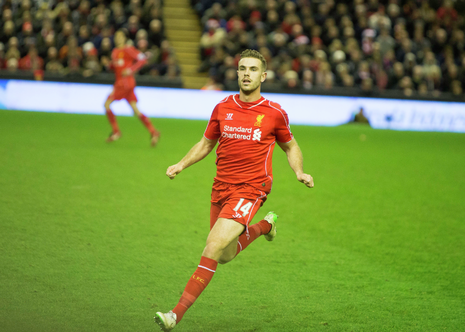Jordan Henderson has proven that his morals have a price
After his LGBTQ+ activism, Jordan Henderson’s move to Al-Ettifaq shocked fans. Ed Marsh reacts to his recent interview with The Athletic, in which Henderson attempted to justify his actions

When Jordan Henderson left Liverpool to join Al-Ettifaq, his move was met with widespread scrutiny. This was a player who had been at the forefront of LGBTQ+ issues within football and appeared to have a genuine interest in bringing about positive change. By moving to Saudi Arabia, thus ignoring rights issues within the state, Henderson has lost the right to be seen as the hero he once was.
His recent interview with The Athletic plainly patronises those criticising. Henderson, a player seen by many in this nation as a leader, has proven himself to be nothing more than a coward. Throughout the interview, Henderson’s crass obsession with his desire to feel “wanted” is clear. By positioning himself as an outcast at Liverpool, Henderson tries to remove a sense of responsibility from his transfer.
As Henderson would have you believe, the kindness of Gerrard and Al-Ettifaq saved him from being a Jürgen Klopp cast-off. They also provided him with a “project”, a favourite buzzword of footballers to signal that they are helping to build a team from the ground up. The notion that a 33-year-old Champions-League-winning captain could have such a strong investment in this project, however, is incredibly hard to believe.
It is yet another example of a level of ignorance so widespread within the modern game that players feel they can continue to peddle lies about how little influence money has within their decision-making. By both doubling down on his excitement surrounding Al-Ettifaq and the Saudi Pro League and tiptoeing around the issue of wages, Henderson is showing just how out of touch football has become with reality. The fact that he believes the millions who will read the interview will simply believe him only proves his sense of entitlement.
Most sickening of all, however, are Henderson’s responses when questioned on the Saudi Arabian approach to LGBTQ+ rights. It demonstrates a level of evasiveness so commonly attributed to the politicians of today. Each answer involves ambiguity where he was once emphatically clear. Even when initially answering questions concerning the treatment of the LGBTQ+ community, Henderson jumps to prematurely defend himself. The ever-so-overused “I’m not a politician” line is bandied about with ease.
Worse, though, is when he so casually says: “I think there was always going to be criticism regardless of what I did, whether I stayed, whether I went.” Henderson is equating the footballing criticisms aimed at him if he was to stay at Liverpool an extra season with the much more serious criticisms levied against him for endorsing the actions of the state of Saudi Arabia. He has the gall to suggest that any criticism is the same. All bad, all inevitable. The inability to separate the two is dangerously tone-deaf.
Henderson goes on to recite his experiences at the 2022 Qatar World Cup, one of the plainest examples of manufactured sportswashing you’ll find, as a counterpoint to the experiences of many LGBTQ+ citizens in the Arab world. Once again, astonishingly insulting.
Every time, when probed by Adam Crafton and David Ornstein, Henderson proves that his primary concern is himself. He is quick to highlight all the work he’s done for the LGBTQ+ community before. The laces. The armbands. I do not wish for one second to undermine the importance of initiatives such as these for bringing visibility and awareness. However, Henderson’s use of his past actions to justify his current decisions simply does not work. No one is denying his work in the past, they are simply highlighting how this intensifies the problems with his decision this summer.
The final kick in the teeth comes when he says (in regard to the negative reaction since joining Al-Ettifaq): “I think a lot of it is on social media … which I don’t get involved with.” By separating social media from reality, he tries, for a final time, to undermine the criticism. Intentionally or not, he equates social media condemnation with internet trolls. Football has a real issue with online trolling. Criticising a man who was once a leading advocate and voice for the LGBTQ+ community in English football for abandoning those morals, however, does not by any means fall under that issue.
Ultimately, the interview provides another damning example of football and its self-entitlement. Henderson is one of many, a fact that must be emphasised. However, if a person such as him can put a price on his values, then who on earth can’t?
 News / Cambridge academics stand out in King’s 2026 Honours List2 January 2026
News / Cambridge academics stand out in King’s 2026 Honours List2 January 2026 Interviews / You don’t need to peak at Cambridge, says Robin Harding31 December 2025
Interviews / You don’t need to peak at Cambridge, says Robin Harding31 December 2025 Comment / What happened to men at Cambridge?31 December 2025
Comment / What happened to men at Cambridge?31 December 2025 News / AstraZeneca sues for £32 million over faulty construction at Cambridge Campus31 December 2025
News / AstraZeneca sues for £32 million over faulty construction at Cambridge Campus31 December 2025 Features / “It’s a momentary expression of rage”: reforming democracy from Cambridge4 January 2026
Features / “It’s a momentary expression of rage”: reforming democracy from Cambridge4 January 2026










